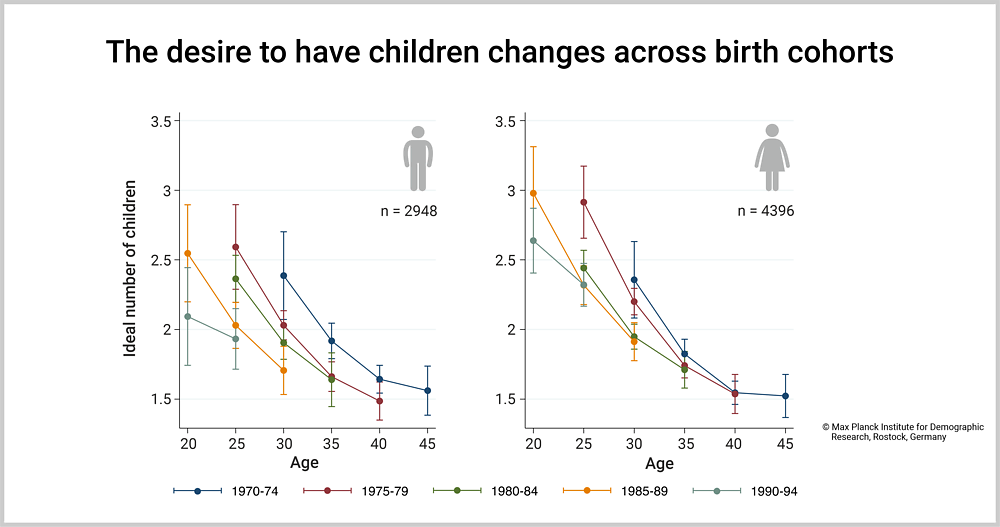August 25, 2023 | News
More People Want to Remain Childless
[SPOTLIGHT]
Study shows changes in individual desire to have children in Finland
Fertility is on the decline - especially in Western countries. This is particularly surprising in a country like Finland. After all, the conditions for families here are excellent. Previous attempts to explain the decline in fertility, such as a lack of gender equality or socio-economic reasons, have not been effective. There must be other factors at work. Researchers from the University of Helsinki, the Max Planck Institute for Demographic Research, the Population Research Institute and Kela (the Social Insurance Institution of Finland) have investigated whether the desire to have children has changed among the younger generations. The study did not examine whether this has a direct impact on fertility, but notes that more and more people want to remain childless. Whether this change in the desire to have children is responsible for the decline in fertility remains an open question and should be the subject of future research.

Various family models: In Finland, more and more people, especially in the younger generations, are choosing to live without children. © iStockphoto.com/Rudzhan Nagiev
"Over the past 30 years, the two-child ideal has become widespread in high-income countries. However, fertility rates do not reflect this. We were interested in people's personal ideal number of children, i.e. what they want to have, rather than what they think is the general ideal number of children. What influence do education, income, and work situation have on this value?" says Kateryna Golovina, a researcher at the University of Helsinki, explaining the study's research questions.
The study used data from the Finnish Family Barometer surveys from 2007 to 2018 for the 1970-74, 1975-79, 1980-84, 1985-89 and 1990-94 birth cohorts. The personal ideal number of children at different stages of life (ages) and the relationship between the ideal number of children and the current socioeconomic status of the respondents were analyzed.

For men and women, adjusted predictions of mean ideal number of children by age and birth cohort. © University of Helsinki / MPIDR
The analysis of the data shows that the ideal number of children decreases in the younger birth cohorts. For example, men born between 1975 and 1979 wanted an average of 2.6 children by age 25, while women wanted 2.9. By contrast, men born between 1985 and 1989 wanted only 2.1 children by age 25, while the average number of children desired by women fell to 2.3. The study's findings suggest that socioeconomic status is not as important in these cohorts, nor are changes in this parameter over time playing a major role in current trends. "Rather, we are witnessing a fundamental change in attitudes toward childbearing. This is not because the ideal number of children is declining among those who want to have children, but because the ideal of living without children is spreading, meaning that more and more people want to remain childless," says Natalie Nitsche of the Max Planck Institute for Demographic Research. For example, while only 4 to 5 percent of men and 2 to 9 percent of women in the 1975 to 1984 birth cohorts said they wanted to live without children, 25 percent of men and about 22 percent of women in the 1985 to 1994 cohorts said they wanted to live without children.
However, the ideal number of children has declined steadily throughout the period. "While we know from research that the ideal number of children has declined in recent decades, we know little about whether there is also a cohort shift in the desire to have children, i.e. whether younger generations want fewer children than older generations, simply because there are few data sets that allow for this perspective. But it is proving to be a promising tool for mapping ideational change," says Nitsche. "Our study shows that attitudes towards parenthood have changed in Finland and that a new culture is developing around having children. There are more and more people who don't want to have children. It will be interesting to see whether the desire to be childless at the age of 25 continues later. More research in this area is definitely needed to better understand this development," says the researcher.
Original Publication
Golovina, Kateryna; Nitsche, Natalie; Berg, Venla; Miettinen, Anneli, Rotkirch, Anna; Jokela, Markus: Birth cohort changes in fertility ideals: Evidence from repeated cross-sectional surveys in Finland in European Sociological Review. DOI: https://doi.org/10.1093/esr/jcad048
Authors and Affiliations
Kateryna Golovina, Helsinki Collegium for Advanced Studies at the University of Helsinki
Natalie Nitsche, Max Planck Institute for Demographic Research, Rostock
Venla Berg, Population Research Institute, Väestöliitto, Helsinki and Institute of Criminology and Legal Policy, University of Helsinki
Anneli Miettinen, Kela, the Social Insurance Institution of Finland, Helsinki
Anna Rotkirch, Population Research Institute, Väestöliitto, Helsinki
Markus Jokela, Department of Psychology and Logopedics, Faculty of Medicine, University of Helsinki
Keywords
fertility, ideal number of children, childless, childfree, cohort change, education, income, employment status